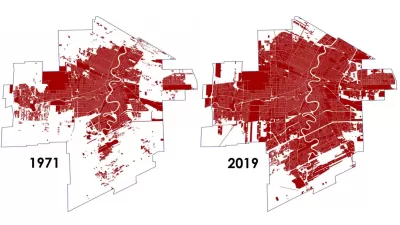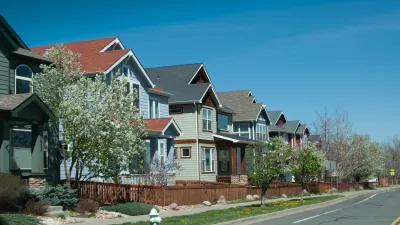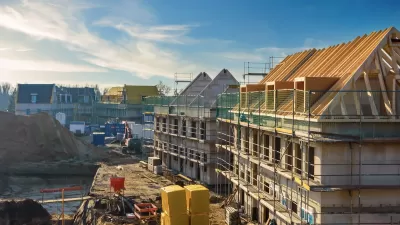Impact fess, also known as growth fees, are creating controversy in the Canadian city of Winnpeg, even as the city prepares new infill development guidelines to quell development controversies in older neighborhoods.

Bartley Kives reports from Winnipeg, where the city is wrestling with a desire to add more infill.
Kives traces the controversy back to 2016, when the city introduced impact fees, also known as growth fees. "The fees apply to new developments in some outlying neighbourhoods of Winnipeg," explains Kives. "Developers dislike them — a legal challenge against Winnipeg's authority to levy the charges is still winding its way through the courts at the speed of a large and heavily sedated sloth."
Winnipeg Mayor Brian Bowman has been a big supporter of impact fees, arguing that the city needs revenue to fund the infrastructure that supports the city's expansion. Still, the impact fees haven't generated any spending, despite raising $11 million, because of the ongoing court case.
A city plan to roll out the impact fees to older parts of the city, subject to infill development, also raises question about the goals of the fee program. "In theory, growth fees disincentivize urban sprawl — which is costly for cities — and make development in older neighbourhoods more attractive," explains Kives.
Taxing infill developments would spread the disincentive around. "To urban planning nerds, it may seem counterproductive to apply growth fees to infill development, which is the type of growth cities all over North America are trying to encourage."
There's at least one voice in power in the city who thinks infill projects are burdensome enough on the city's resources to warrant an impact fee, City council property chair Brian Mayes. "Mayes said he's not convinced infill pays for itself. On Friday, he said any increase in population results in greater stresses on Winnipeg's sewage-treatment system, for starters," reports Kives.
Set against that political backdrop, the city is also preparing new infill guidelines, designed to help new developments blend in to the existing urban fabric.
FULL STORY: What do we want? Infill housing! How do we get it? We have no idea!

Maui's Vacation Rental Debate Turns Ugly
Verbal attacks, misinformation campaigns and fistfights plague a high-stakes debate to convert thousands of vacation rentals into long-term housing.

Planetizen Federal Action Tracker
A weekly monitor of how Trump’s orders and actions are impacting planners and planning in America.

San Francisco Suspends Traffic Calming Amidst Record Deaths
Citing “a challenging fiscal landscape,” the city will cease the program on the heels of 42 traffic deaths, including 24 pedestrians.

Defunct Pittsburgh Power Plant to Become Residential Tower
A decommissioned steam heat plant will be redeveloped into almost 100 affordable housing units.

Trump Prompts Restructuring of Transportation Research Board in “Unprecedented Overreach”
The TRB has eliminated more than half of its committees including those focused on climate, equity, and cities.

Amtrak Rolls Out New Orleans to Alabama “Mardi Gras” Train
The new service will operate morning and evening departures between Mobile and New Orleans.
Urban Design for Planners 1: Software Tools
This six-course series explores essential urban design concepts using open source software and equips planners with the tools they need to participate fully in the urban design process.
Planning for Universal Design
Learn the tools for implementing Universal Design in planning regulations.
Heyer Gruel & Associates PA
JM Goldson LLC
Custer County Colorado
City of Camden Redevelopment Agency
City of Astoria
Transportation Research & Education Center (TREC) at Portland State University
Jefferson Parish Government
Camden Redevelopment Agency
City of Claremont





























